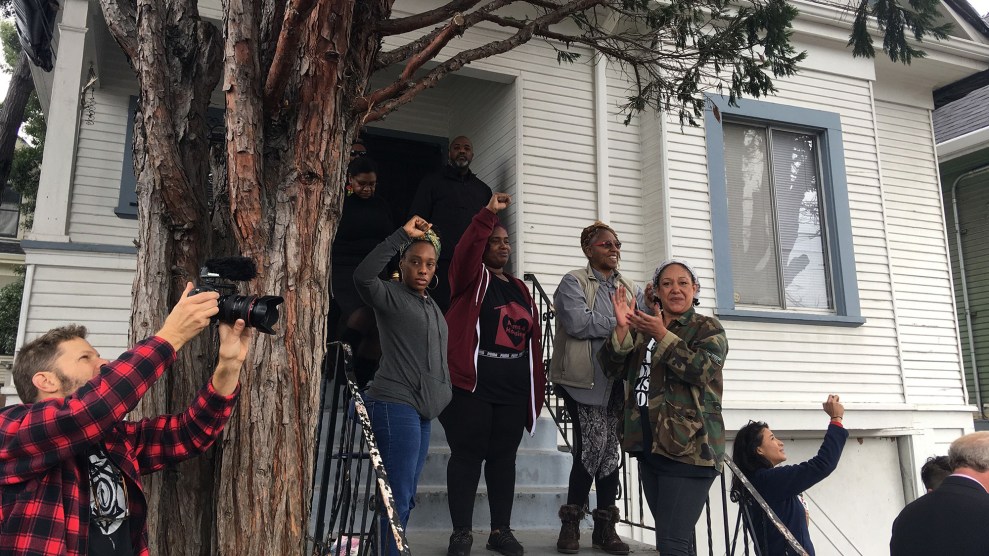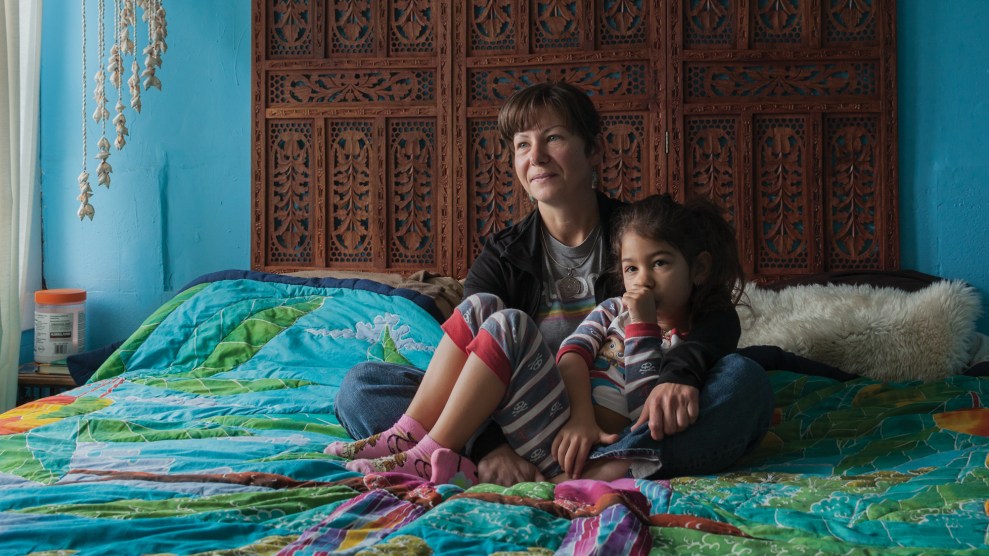
Moms 4 Housing members and activists including former Oakland mayoral candidate Cat Brooks held at press conference at the West Oakland house the moms are occupying. Marisa Endicott
By the time Dominique Walker started squatting in an Oakland home with her five-year-old daughter and one-year-old son, she’d exhausted all other options. Walker, who had fled domestic violence in Mississippi, knew it would be hard to find a place, amidst the housing crisis, in the city where she’d grown up. But she wasn’t prepared for what she encountered: Thousands of people, predominantly black and brown, forced to sleep on the street, in shelters, or on couches, despite the fact that many had a job—or two or three.
“When I saw the condition of my home, Oakland, it changed everything for me,” Walker said.
After moving back in April, Walker and her kids first stayed with relatives. They’d all been pushed out by high housing costs to neighboring cities like Antioch and Stockton. Walker spent hours each day commuting to work in Oakland and her kids’ daycare in Berkeley. They bounced around from house to house and sometimes hotel rooms while she tried to find something more permanent, but she found city support programs were maxed out. The hardest part about being homeless, she says, was having to explain to her kids why they didn’t have their own space, why they constantly had to be on the move. “My children weren’t able to really be free.”
Walker is a lifelong organizer. She was a student co-founder of her high school in Oakland, the School of Social Justice and Community Development. In Mississippi, she worked on human rights lawyer Chokwe Lumumba’s mayoral campaign and then with a radical worker cooperative in Jackson.
So, back in Oakland, when she found her family in a tough spot, Walker started looking into the causes of homelessness in her community. And that’s when she began to notice the “for rent” signs, vacant lots, and new, unoccupied high rises everywhere. Then she came across an empty house on a quiet block on Magnolia Street in West Oakland (the “only eyesore on the block,” she says). She did some research and found out it was owned by Wedgewood Property Management, which labels itself as a “leading acquirer of distressed residential real estate.” The house had sat empty for about two years, and some neighbors, who Walker talked to, worried it would decay or become a trap house for drugs or other illegal activities. In November, Walker, another mother, and their kids moved into the vacant home.
Instead of trying to fly under the radar, Walker started Moms 4 Housing, using the previously empty house as a platform to draw attention to lots and homes that sit vacant while the city struggles with rampant homelessness. There are about 4,000 vacant parcels in Oakland, roughly the same as the reported number of homeless people in the city. (While less than 25 percent of Oakland residents are Black, they account for almost 70 percent of the homeless population.) And even when those properties are eventually put on the market, odds are many won’t be able to afford them. The median rent for a one-bedroom is now $2,470, and it’s $2,990 for a two-bedroom, a 5 percent increase from last year.
Moms 4 Housing considers Wedgewood a “displacement machine”—buying up properties in areas on the cusp of gentrification and sitting on them until their values surge. The moms want Wedgewood to turn the house over to them under the principal that housing is a human right, and argue that other investor-owned properties should be given back to communities who have been displaced by soaring rents. The group’s bold organizing tactics—they send text message alerts to rally supporters around press conferences, canvassing, and phone zaps—have also put City Hall on notice, demanding Mayor Libby Schaaf take more aggressive action. The’ve called her out for the city’s failure to collect fees from housing developers who don’t build affordable units as required by an Oakland mandate.
“It was an answer to a desperate need,” Walker says of their decision to occupy the Magnolia Street house. “It should be illegal to have vacant houses and have people sleeping on the streets. I feel like there’s a moral crisis. There’s a profiteering crisis…I think that’s where the crime lies.”
Traditionally, we think of vacant houses as an issue in weak housing markets and struggling economies suffering the lingering effects of the foreclosure crisis. But places with hot real estate markets have been wrestling with the problem, too. That’s especially true when changes to the housing market happen rapidly, like in the Bay Area, where gentrification in previously shunned neighborhoods like West and North Oakland has pushed out long-time residents, who are then unable to benefit from new investment in the communities.
There isn’t one single factor that causes homes to turn vacant in booming markets, but speculative investors like Wedgewood are a common target. In 2016, Wedgewood’s CEO boasted that the company purchased over 200 foreclosed or soon-to-be foreclosed homes nationwide a month, calling the distressed housing market “hot and sexy.”
“We feel like we have a right to this space and this home,” Walker says. “This home belongs back in the hands of the community from which it was taken.”
According to Walker, Wedgewood never responded to a request to negotiate a takeover of the property. But in December, she found an eviction notice on the door. The women are promising to fight back if and when the sheriff shows up to kick them out, and supporters plan to show up en masse. In the meantime, Moms 4 Housing has been fixing up the house with the help of volunteers and donations: getting utilities running, power-washing the exterior, making it their home.
For their part, Wedgewood says they haven’t heard from the mothers. The heavy-hitting PR firm the company is working with told the Mercury News that Wedgewood “would be willing to discuss the opportunity to purchase the home, like it would with any other potential buyer,” but that the women would have to leave first. Wedgewood bought the home in a foreclosure sale in July with plans to flip it and put it back on the market.
Public outcry over vacancies in cities desperate for more housing has spurred policy makers to try and tackle the issue. Vacancy taxes have become a popular solution. In February, New York Mayor Bill DeBlasio called on state legislators to tax languishing commercial properties. San Francisco residents will vote on a retail vacancy tax in March meant to discourage landlords who hold out on renting their storefronts in search of tenants willing to pay excessive rates. San Diego officials are looking into the possibility of putting a vacant home tax on the ballot next year, and Honolulu and Los Angeles are toying with the idea as well. In an attempt to discourage corporate speculators, Oakland recently started implementing a tax, approved by voters in 2018, on property owners who keep lots vacant and apartment rental units open. But the rollout has been complicated and confusing, a sign of what experts caution is a very complex issue.
One of those complexities is that vacancy is extremely difficult to track. Because of that, says Shane Phillips, a housing policy expert based at the University of California, Los Angeles, people often overestimate vacancy rates in thriving cities. It’s typical for new buildings with hundreds of units to take up to a year to fill up, for instance, he says, which can give the impression of exaggerated vacancy. And it’s especially hard to track vacancy in rental units. Asking why a rental is vacant is “kind of the same as asking why we don’t have zero percent unemployment,” Phillips says. “It’s an issue of friction: people leave, people come, you have to do a bunch of repairs, find the new tenants.”
The reason a property is sitting empty has big implications for diagnosing the root cause of the problem, and figuring out the right antidote. A vacancy tax will work differently on homes in stagnant markets, abandoned after owners default on payments, as opposed to empty lots owned by speculative investors in up and coming areas. If a city’s vacancies are linked to vacation rentals like Airbnb, or second homes, that might require a slightly different approach.
“Every vacant property has a story story behind it,” says Joseph Schilling, a senior research associate at the Urban Institute who has devoted the majority of his career to studying how communities reclaim vacant properties. “What is the owner’s story? What is the neighborhood story? What are the market factors that have caused it to become vacant? It’s critical to unlock that in order to figure out how best to stabilize the property or neighborhood.” This summer, New York City passed legislation to establish a first-of-its-kind database to gather better data on storefront vacancies. “I can’t stress enough the importance of having a current database of all vacant and abandoned properties, because then you will know where they are, what condition they’re in, what the ownership is,” Schilling says. “Then, based on that, you want to have a range of strategies, a portfolio of policies and programs, in order to adjust and respond to all these different characteristics and circumstances.”
Despite the recent interest in vacancy taxes, there is little research on their impact so far. And the taxes are only as good as their enforcement. A 2017 report by the DC city auditor found that the city had failed to execute its vacant and blighted property tax program in every way, from identifying and inspecting properties to issuing infractions and meeting deadlines. And such taxes can be ineffective or even have unintended consequences if there aren’t thoughtful exemptions for groups like community-based organizations or lower income people, Schilling says. “I would caution all public officials to do their homework before immediately using that solution.”
That’s not to say that vacancy taxes can’t work. They can bring in much needed tax revenue. Estimates by officials in 2018, before Oakland’s measure passed, predicted the city could see as much as $20 million a year for homeless solutions. (Oakland’s tax also has exemptions for low-income households and unbuildable land.) Vancouver, which implemented a tax on non-principal homes in 2017, brought in $29 million mostly for affordable housing projects in its first year (though it didn’t improve the vacancy rate much). But Schilling emphasizes the importance of other tools, like housing code enforcement and tenant protections, as essential pieces of the puzzle that can also help keep properties from declining and tenants from being evicted in the first place.
Despite the complicated nature and conflicting opinions on vacancies, in a city like Oakland, where tent encampments fill underpasses and the homeless population jumped by almost 50 percent in two years, empty lots and houses stand as a symbol of deep injustice. Because of that, Moms 4 Housing has seen a groundswell of support. Community members and local organizations have shown up at the home on Magnolia street to show solidarity. Neighbors have invited them to their houses and joined the text alert system, Walker says. An online petition calling on Wedgewood to turn over the house has garnered over 5,400 signatures, and some groups are calling for the property to be turned into a community land trust. On Monday, dozens accompanied Moms 4 Housing to the courthouse to file a right for possession claim on the house, pointing out the “home has been vacant for over two years during the worst housing crisis in California history.” Any tenant—legal or not—can challenge an eviction, and in the meantime they can stay, so the mothers bought themselves at least a little more time in the house. They have a court date on December 30.
“We’re about the ideal of imagining that we can take these powerful resources that are changing our world and this economy and put them to use of servicing humanity,” shouted Ethel Long-Scott, an activist with the Poor People’s Campaign, from the steps of the West Oakland home at a press conference earlier this month. “We’ve got to have an image of what kind of new world we want to see. We applaud [Moms 4 Housing] for doing what our damn city government won’t do—getting our children and families off the damn streets and into houses.”
In the meantime, Walker’s son has taken his first steps since moving into the house. Her daughter wants to decorate and finally stopped asking where they’d be going next.
“It’s a lot less stressful for me on my day-to-day, and I’m happy that my kids are comfortable, but I’m fighting for all unhoused mothers and children,” Walker says. She’s not afraid of speaking out and risking eviction. “It was a bigger risk sleeping in my car with my children than taking a stand on hoping that this brings awareness to the crisis here.”

















